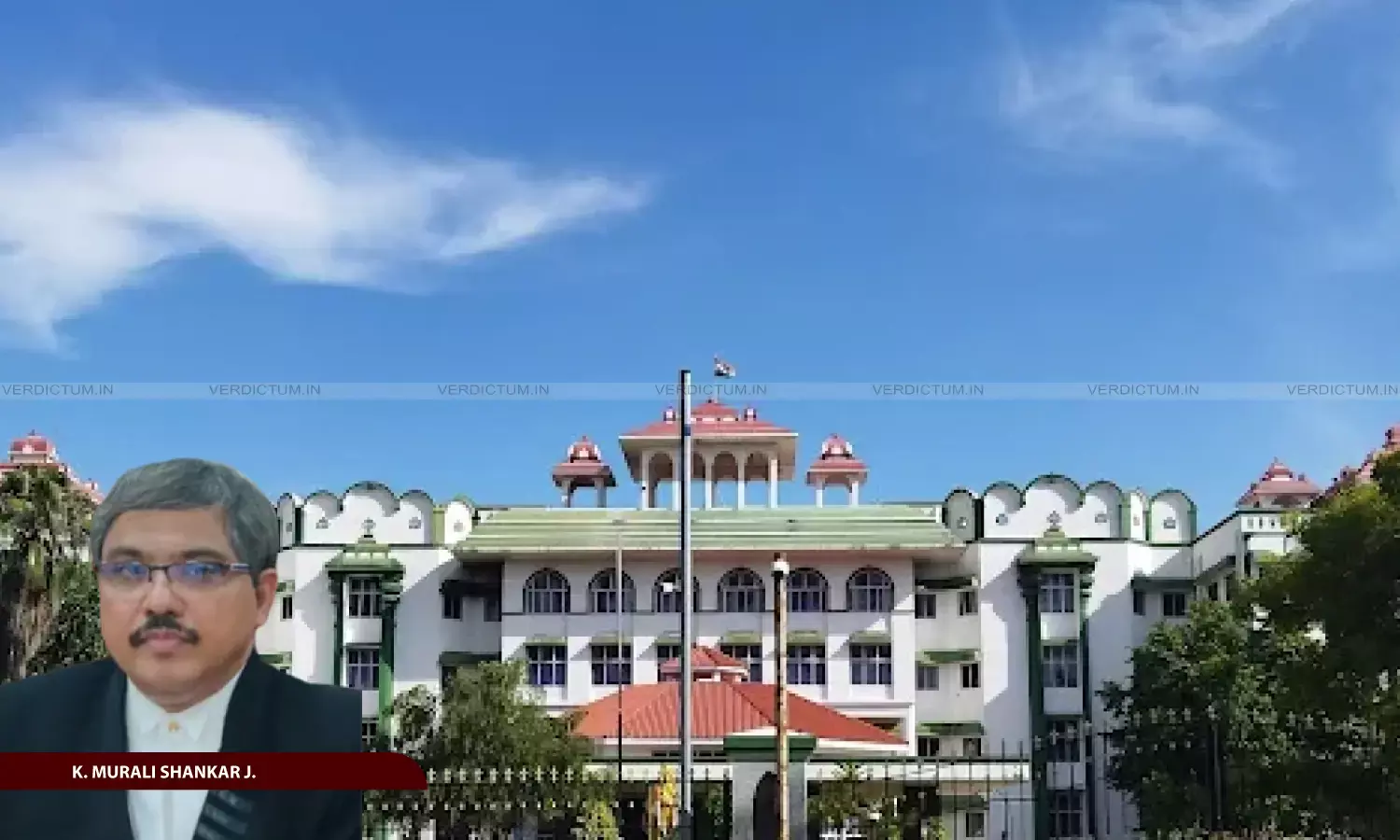Madras High Court: Impleading Victims Or Their Parents Essential In Regular Bail & Sentence Suspension Applications; Not Necessary In Criminal Appeals
The Madras High Court emphasised that involving the victim's parents, de facto Complainant, or guardian is essential in both Regular and Appeal Bail Applications filed by individuals accused of POCSO Act offences.

Justice K. Murali Shankar, Madras High Court, Madurai Bench
The Madras High Court held that impleading victims or their parents is essential in regular bail applications and suspension of sentence applications but is not necessary in Criminal Appeals.
The Madurai Bench was hearing three Criminal Appeals preferred against the Judgments of conviction and sentence for the offence under the Protection of Children from Sexual Offences Act, 2012 (POCSO Act).
A Single Bench of Justice K. Murali Shankar observed, “… involving the victim or their parents is not necessary in criminal appeals challenging the convictions under the POCSO Act. However, their impleadment is essential in regular bail applications under Section 483 BNSS (Section 439 Cr.P.C.) and suspension of sentence application under Section 430 BNSS (Section 389 Cr.P.C.,) It is further clarified that the victim should not be directly involved or served notice in any proceedings. Instead, notice should be served to the victim's parents or complainant through the address provided by the State Counsel.”
The Bench emphasised that involving the victim's parents, de facto Complainant, or guardian is essential in both Regular and Appeal Bail Applications filed by individuals accused of POCSO Act offences.
Advocate G. Karuppasamypandiyan represented the Appellants/Accused, while Government Advocate B. Thanga Aravind represented the Respondent/State.
Case Background
In the Appeals, the Appellants-accused persons filed Applications seeking suspension of sentence under Section 430(2) of the Bharatiya Nagarik Suraksha Sanhita, 2023 (BNSS). The Court raised a query regarding whether the de facto Complainant is a necessary party in Criminal Appeals challenging convictions under the POCSO Act and in applications for suspension of sentence. The counsel for the Appellants submitted that notice is not necessary as neither POCSO Act nor the Rules framed thereunder does not provide for the same.
On the other hand, the Government Advocate for the State submitted that notice is necessary since amended Section 439(1-A) of the Criminal Procedure Code, 1973 (CrPC), provides notice before granting bail to a person accused of an offence under Section 376(3) or 376-AB or Section 376-DA or 376-DB of the Indian Penal Code, 1860 (IPC).
Issue for Consideration
The sole preliminary issue to be determined was whether the defacto Complainant is a necessary party in a Criminal Appeal challenging a conviction under the POCSO Act and in an Application for suspension of sentence, and if so, the manner of their involvement.
Court’s Observations
The High Court in view of the above issue, noted, “The Hon'ble Supreme Court has categorically held that the victim has unbridled participatory rights from the stage of investigation till the culmination of the proceedings in an appeal or revision.”
The Court said that generally, in police-instituted criminal cases, the victim/de facto Complainant is not made a party and in criminal trials under the IPC, POCSO Act, or other special enactments, impleading the victim/de facto Complainant as a party is uncommon.
“However, with court permission, they can engage counsel to assist the Public Prosecutor/Assistant Public Prosecutor under Section 301(2) CrPC, where the counsel's role is limited and prosecution control remains with the Public Prosecutor/Assistant Public Prosecutor. Section 302 CrPC empowers the Judicial Magistrate to permit the de facto complainant to conduct the prosecution independently through private counsel if they demonstrate inadequate prosecution by the Assistant Public Prosecutor”, it added.
The Court elucidated that given the availability of prosecution and defence evidence, as well as the Trial Court's Judgment, the Appellate Court can decide on the conviction's validity by hearing the Prosecutor and Defense Counsel.
“… this Court holds that impleading the victim or their parents/guardians is not mandatory in criminal appeals. However, if they wish to participate, they should be permitted to do so and be heard alongside the Public Prosecutor and defence counsel”, it held.
The Court further observed that the principle under Section 439A CrPC requiring notice to the informant for specific IPC offences against children should logically extend to both regular and Appeal bail applications under the POCSO Act.
“Before suspending the sentence, it is essential to hear the victim's family regarding any potential harassment, threats, or coercion by the accused post-conviction. Without notice and hearing, the appellate court may remain uninformed about crucial developments. While acknowledging that some victims' families may be traumatized and unwilling to participate, others may actively engage to ensure justice is served. Therefore, hearing the victim's side is necessary before granting appeal bail”, it also said.
Conclusion
The Court noted that it is crucial to ensure the victim is not made a party in any proceedings or applications under the POCSO Act, and no direct notice should be served to them and when involving the victim's family or de facto complainant, their identity and details should be protected, and only necessary information should be disclosed without revealing their identity.
“To protect the victim's interest, the Courts may direct the District Legal Services Authority or State Legal Service Authority or the High Court Legal Services Committee to provide legal assistance through their panal Advocates”, it concluded.
Accordingly, the High Court clarified the legal position.
Cause Title- Venkateshwaran v. State of Tamil Nadu (Case Number: Crl.M.P.(MD)Nos.7809, 11825 and 11926 of 2025)
Appearance:
Appellants: Advocates G. Karuppasamypandiyan, A Karthick Kumar, and D. Venkatesh.
Respondent: Government Advocate B. Thanga Aravind


